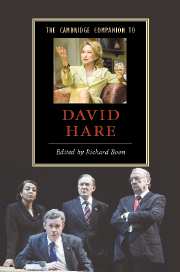10 - ‘Being taken no notice of in ten million homes’
David Hare’s adventures in television
from Part III - Hare on screen
Published online by Cambridge University Press: 28 April 2008
Summary
DOMINIC: Do you do television also?
ESME: Oh, television, really!
AMY: She hates it.
ESME: I do.
AMY: She doesn’t even watch.
ESME: Working your guts out while people do something else. There you are, working. What are they doing? Eating. Or talking. Just great! Being taken no notice of in ten million homes . . . Television? No I don’t want to do it. For as long as London has its fabled West End . . .
David Hare, Amy’s View, 1997A fore-word
It is 1979, and Amy is in conversation with her partner, Dominic - a journalist-critic, soon to be television producer - and her mother, Esme - an actress of the old school who will, by 1995, her stage career on the slide, be playing Nurse Banstead in a television soap. There is possibly a political significance in the fact that David Hare should open his play in the very year that Margaret Thatcher first ascended the Westminster throne, but, given the play's foregrounding of a live theatre/television debate, it takes on a more personal significance when it is realised that the year is immediately bookended by the first broadcasts of two of the only three original plays directed by him for television: Licking Hitler (1978) and Dreams of Leaving (1980). Furthermore, when it is remembered that the first of these existed in an effectively symbiotic relationship with his stage play Plenty (1978, and in 1985 released as a self-adapted film), it is apparent that the nature and potential of the different mediums was very much a current preoccupation.
- Type
- Chapter
- Information
- The Cambridge Companion to David Hare , pp. 153 - 168Publisher: Cambridge University PressPrint publication year: 2007



